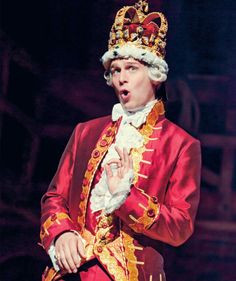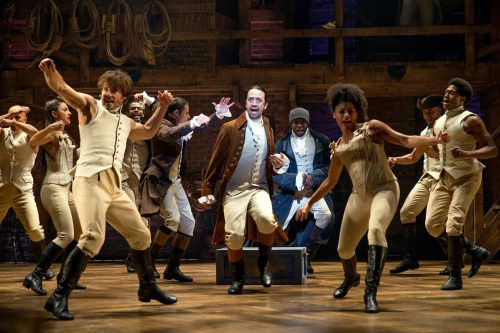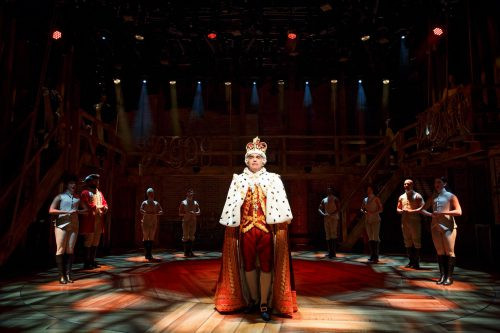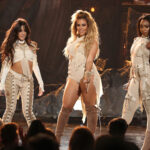Lin-Manuel Miranda’s Hamilton has undeniably taken the world by storm, and for good reason. This groundbreaking musical masterfully blends hip-hop, R&B, and Broadway to tell the story of Alexander Hamilton, one of America’s Founding Fathers. Amidst the revolution and political intrigue, one character consistently steals the spotlight with his hilariously menacing presence and unforgettable tunes: King George III. His songs, distinct in style from the rest of the soundtrack, offer a unique and darkly comedic perspective on the American Revolution.
[youtube https://www.youtube.com/watch?v=fdxLohjwhoQ]
King George’s songs are deliberately crafted to stand apart from the primarily hip-hop and rap infused score of Hamilton. While the revolutionaries express themselves with modern musical styles, King George’s music is a clear homage to British Invasion pop, reminiscent of The Beatles or The Kinks. This stylistic choice is far from accidental. It serves to highlight the King’s outdated worldview and autocratic approach in stark contrast to the forward-thinking, revolutionary spirit of the American colonists. This musical distinction alone makes his songs instantly recognizable and deeply impactful.
His first introduction, “You’ll Be Back,” is perhaps his most iconic number and a masterclass in musical theatre villainy. Sung as a direct address to the burgeoning American colonies, the song is a thinly veiled threat disguised as a love ballad. King George, portrayed with comedic brilliance by Jonathan Groff in the original Broadway cast, laments the colonies’ desire for independence with lines dripping in sarcasm and possessiveness. He reminds them of the “good old days” under his rule, while simultaneously promising to “send a fully armed battalion to remind you of my love.”
 cc426ff5baf39ef4cca5e2753e486525
cc426ff5baf39ef4cca5e2753e486525
The lyrics of “You’ll Be Back” are a fascinating study in manipulation and tyrannical control. King George sings of love and devotion, but his words are laced with a menacing undercurrent. Phrases like “I will fight the fight and win the war, for your love, for your praise” reveal a deeply conditional and self-serving form of affection. It’s not about genuine care for the colonies, but about maintaining power and control. The song brilliantly captures the mindset of a ruler unwilling to relinquish authority, even when faced with a burgeoning revolution. The seemingly sweet melody only amplifies the unsettling nature of his possessive demands.
Beyond “You’ll Be Back,” King George’s subsequent songs further develop his character and comedic, yet slightly pathetic, predicament. “What Comes Next?” follows the American victory at Yorktown and showcases the King’s bewildered and petulant reaction to the loss. He questions the revolutionaries’ next move with a mix of indignation and genuine curiosity, unable to comprehend a world where the colonies are no longer under his thumb.
 07hamilton-slide-id2c-superjumbo
07hamilton-slide-id2c-superjumbo
His final solo number, “I Know Him,” appears later in the musical as George Washington steps down from the presidency. In this song, King George is reduced to a gossiping observer, commenting on the unfolding American political landscape with a mix of schadenfreude and lingering resentment. He believes that the fledgling nation will inevitably fail without his strong hand, showcasing his delusion and inability to accept the reality of American independence.
[youtube https://www.youtube.com/watch?v=b5VqyCQV1Tg]
The brilliance of King George’s songs lies not only in their catchy melodies and witty lyrics, but also in their ability to provide a crucial counterpoint to the revolutionary fervor of the main narrative. They offer a moment of levity and dark humor, reminding the audience of the absurdity of tyranny and the stubbornness of those in power unwilling to adapt to change. While the American revolutionaries are fighting for freedom and self-determination, King George is clinging to outdated notions of divine right and absolute authority.
 10945707_10153074331991241_6017743152074457026_o
10945707_10153074331991241_6017743152074457026_o
In conclusion, the songs of King George in Hamilton are far more than just comedic interludes. They are expertly crafted pieces of musical theatre that enrich the narrative, provide crucial character development, and offer a darkly humorous perspective on the themes of revolution, power, and control. From the possessive threats of “You’ll Be Back” to the bewildered resignation of “I Know Him,” these “tyrannical ballads” are integral to the enduring appeal and brilliance of Hamilton, ensuring that King George remains one of the most memorable and talked-about characters in modern musical theatre.


